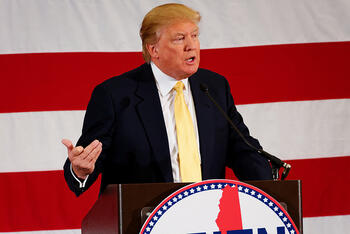
Given the endless scandals swarming around him, Donald Trump’s presidency may prove, to quote Thomas Hobbes, to be “nasty, brutish and short.” But even if Trump ends up out of office sooner than planned, we will continue to live in a world shaped by him for years to come.
He retains surprisingly high ratings for the economy and keeping the country safe. His perceived successes have allowed him, in a way matched only by Ronald Reagan, to alter American politics, and policy, in ways that could well persist well after he has returned to the gold-plated garishness of the Trump Tower.
The economic equation
Trump’s biggest triumph has been the economy. Despite repeated tales of how tariffs are destroying manufacturers, the turnaround in the industrial sector, going negative in the last year of President Obama’s term, is enjoying its best growth since the mid-1990s. Even retail, a big employer of blue-collar workers, has expanded. Critically, incomes finally are up for the lower deciles of the labor force, including youth.
There’s nothing that guarantees this recovery will continue, but Trump can boast that he has accomplished things that Obama failed to deliver in his eight years of office. Democrats might mutter that renewed growth has come from regulatory reforms and big corporate tax breaks, but that’s making The Donald’s point: A continuance of Obama-style economic and regulatory policy would have failed most Americans outside of his Wall Street and Silicon Valley bankrollers.
Trump has also benefited those geographies that supported him. Under Obama, economic progress focused largely on high-tech, increasingly post-industrial states like California, New York and Massachusetts. Now, with the industrial and energy sectors rebounding, some of the fastest income growth, notes the federal Bureau of Economic Analysis, is taking place in Texas, the southeast, parts of the Midwest and the mountain states. The very places that elected him.
Near the bottom of the totem pole? New York and California, bastions of the “resistance.”
The global perspective
Trump is hardly well-respected abroad, notably in Europe and Canada, but his foreign policy is leaving an important legacy. He has successfully exposed the fundamentally mercantilist approach of our European allies, notably Germany, not to mention the massive manipulations employed by China and its imitators to game trade relations.
It will be hard for Democrats to reverse Trump’s trade policy if they want to appeal to voters in the nation’s heartland, and among working-class voters. They are aware that “free trade,” as currently practiced, works well for the well-placed established establishment duopoly but not for millions of others. Progressive Democrats, if worthy of the name, could up the ante even further.
Trump’s nationalism will remain an important factor, at least until the Baby Boomers finally kick off. Whatever we might think of American “greatness,” the current relative rise of the U.S. — to the utter bafflement of almost the entire U.S. media — suggests our resource and talent-rich country remains in a fundamentally better situation than largely stagnant Europe, debt-ridden, corrupt China and an increasingly pathetic Russia, so broke that is allegedly considering giving of millions of acres of farmland to keep the Middle Kingdom fed.
Then there’s always Paris, where the accords are the holy writ of green propaganda but in reality are not even being remotely followed by such scolds as in Europe while China continues to boost greenhouse gases. The U.S. meanwhile seems the one big emitter actually cutting emissions.
Can the wreckage be repaired?
On the evening Trump was elected, I was sitting at dinner with my friend Henry Cisneros, the former mayor of San Antonio and HUD secretary. When he announced, to my surprise, that Trump had won, Henry admitted that the New York billionaire had seen things few politicians had recognized — most notably the resentment in Middle America against the sophisticated elites.
Sadly, Trump has fumbled the chance to build on this insight. Despite a strong economy, Trump continues to play his favorite tunes of divisiveness and petty jealousy. He has undermined his rising Hispanic and African-American support from an improving economy, in degrading personal spats with LeBron James and sometimes cruel immigration policies.
Yet once The Donald goes, or is hopelessly weakened, his imprint will remain. Following the lead of predecessor Barack Obama, Trump effectively killed both neoconservatism and liberal Democratic messianism. It will also be difficult for any president — of either party — to embrace sweeping trade agreements perceived to hurt middle Americans.
He may not be known as the great populist, as some, including author Conrad Black believe. His manifest character flaws have doomed his presidency, but the defenders of the widely unpopular bipartisan status quo may not get off so easy, either. The country may remain more divided than ever, but it will never again be quite the same.
This piece originally appeared in The Orange County Register.
Joel Kotkin is executive editor of NewGeography.com. He is the Roger Hobbs Distinguished Fellow in Urban Studies at Chapman University and executive director of the Houston-based Center for Opportunity Urbanism. His newest book is The Human City: Urbanism for the rest of us. He is also author of The New Class Conflict, The City: A Global History, and The Next Hundred Million: America in 2050. He lives in Orange County, CA.
Photo: Michael Vadon, via Flickr, using CC License.












